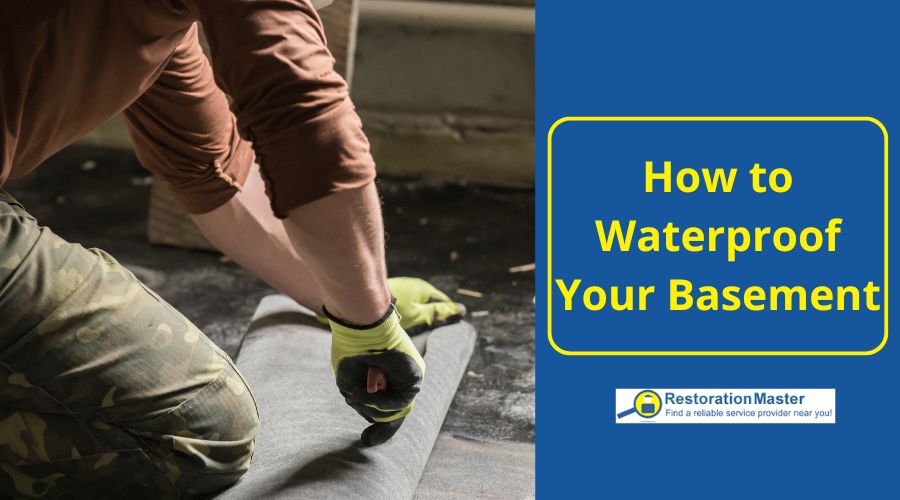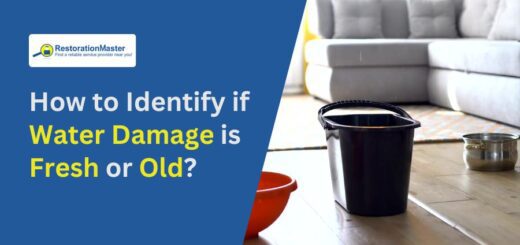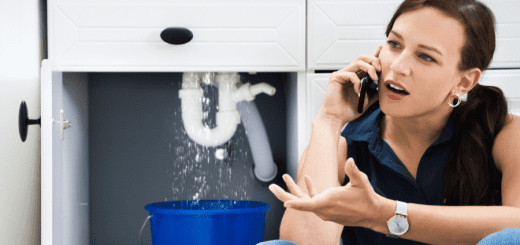Expert Guide to Basement Waterproofing: What Homeowners Need to Know

If you’ve ever walked into your basement and caught the faint scent of dampness—or worse, discovered standing water—you’re not alone. Basements are naturally prone to water intrusion. Whether your home is decades old or relatively new, the ground around your foundation is constantly shifting, settling, and collecting moisture. WaterproofingWaterproofing is the application of materials or coatings de... More isn’t just a fix—it’s an investment in your home’s long-term stability and livability.
Let’s break down what’s really going on below the surface, how modern waterproofingWaterproofing is the application of materials or coatings de... More methods have evolved, and what homeowners should expect when tackling basement water issues today.
What Causes Basement Water Damage
Before you can protect your home, it helps to know why water is sneaking into your basement in the first place—and what kind of trouble it can bring along. What Usually Lets Water In?
- Poor Yard Drainage: If your yard slopes toward your house instead of away, rainwater pools around your foundation. That buildup of water pushes hard against your basement walls, looking for cracks to slip through.
- Gutters and Downspouts That Don’t Work: When gutters get clogged or downspouts are broken, water spills right next to your foundation instead of being safely carried away. That’s an invitation for leaks.
- Foundation Cracks: As your home settles or as the soil shifts and freezes over time, tiny cracks can appear in your foundation walls or floor. These cracks might start small, but they can grow and let water in.
- High GroundwaterGroundwater is water that exists beneath the earth’s surfa... More Levels: Sometimes, especially after heavy rains or melting snow, the water table rises and sits just beneath your basement floor. When that happens, water can seep up through the concrete or cracks.
- Leaky Pipes: A plumbing leak inside your walls or under the basement floor can keep the area damp for a long time, even if you don’t see standing water.
- Sump Pump Problems: If your sump pumpA sump pump is a pump installed in a basement or crawlspace ... More stops working or isn’t there at all, water collected in the sump basin has no way out — and that means floodingFlooding is the overflow or accumulation of water in areas t... More.
- Hydrostatic Pressure: This is the fancy term for the weight of saturated soil pushing water through porousPorous describes a material that contains small openings or ... More concrete or any cracks it finds. It’s a constant force that can do a lot of damage if left unchecked.
- Missing or Failing WaterproofingWaterproofing is the application of materials or coatings de... More: Older homes often don’t have modern waterproofingWaterproofing is the application of materials or coatings de... More membranes or drainage systems in place, making it easier for water to get inside.
We’ve found a clear, step-by-step video that shows exactly how to handle a sewageSewage is wastewater containing biological and chemical cont... More backup safely and effectively. Take a few minutes to watch it — it might just save you a lot of trouble down the road!
Why Basement Waterproofing is a Smart Move Today
Moisture doesn’t just damage what you can see—it impacts everything beneath the surface. Damp basements are often the first step toward costly foundation issues, airborne moldMold is a type of fungus that grows in damp or humid conditi... More sporesSpores are microscopic reproductive units of fungi or mold t... More, and persistent humidityHumidity is the amount of moisture or water vapor present in... More that spreads throughout your home.
And here’s something most homeowners don’t realize: once water finds a way into your basement, it remembers the path. Without professional waterproofingWaterproofing is the application of materials or coatings de... More, that path only grows wider—often leading to issues that require the help of a water damage restorationWater damage restoration is the professional process of clea... More expert to fully resolve.
Increased rainfall patterns and rapid snowmelt events across many regions are putting more pressure than ever on foundations. Clay-heavy soils swell and contract aggressively with each weather shift, putting homes at greater risk of leaks and cracking. That’s why basement waterproofingWaterproofing is the application of materials or coatings de... More is no longer a “maybe someday” item—it’s a preventative essential.
The Signs of a Basement Water Problem
The most obvious sign—puddles—is usually the last stage of a bigger problem. If you spot any of these warning signs, water is already affecting your basement:
- Efflorescence: A white, powdery substance on walls. This indicates water is moving through the concrete and evaporating, leaving behind mineral salts.
- Musty Odors: Even if everything appears dry, moldMold is a type of fungus that grows in damp or humid conditi... More and mildewMildew is a type of fungus that grows on damp surfaces, typi... More may already be growing behind walls or in porousPorous describes a material that contains small openings or ... More materials.
- Peeling Paint or Damp Walls: Paint bubbling or flaking off basement walls points to trapped moisture beneath the surface.
- Cracks in Foundation Walls or Floor: Small cracks often widen over time and become entry points for water—especially during heavy rain or freeze/thaw cycles.
- RustRust is a reddish-brown oxide that forms on iron or steel du... More on Appliances or Furniture: Basements with consistent humidityHumidity is the amount of moisture or water vapor present in... More or hidden leaks may damage anything stored down there, including HVAC systems or water heaters.
How Modern Waterproofing Works: Interior vs. Exterior Solutions
The most effective waterproofingWaterproofing is the application of materials or coatings de... More isn’t about one product—it’s about choosing the right combination of systems based on your home’s layout, foundation type, and local soil conditions.
Interior Waterproofing: Managing Water from the Inside
Interior systems are ideal for controlling groundwaterGroundwater is water that exists beneath the earth’s surfa... More that’s already made it past your foundation. These solutions manage moisture before it damages your belongings or promotes moldMold is a type of fungus that grows in damp or humid conditi... More growth.
- Interior Drainage Systems: Often installed along the perimeter of the basement floor, beneath the slab. These channels direct water into a sump basin before it ever reaches the interior.
- Sump PumpA sump pump is a pump installed in a basement or crawlspace ... More Installation: A must-have for homes with high water tables. Modern sump pumps often include backup battery systems and smart monitors that alert you to failures or rising water.
- VaporVapor is the gaseous form of a substance that is typically l... More Barriers and Wall Panels: High-grade vaporVapor is the gaseous form of a substance that is typically l... More barriers are applied to basement walls to block moisture. In finished basements, decorative, mold-resistant wall panels can be installed over waterproof membranes.
Interior systems are often less invasive and cost-effective, but they don’t prevent water from entering—only from collecting inside.
Exterior Waterproofing: Blocking Water at the Source
Exterior waterproofingWaterproofing is the application of materials or coatings de... More is the most comprehensive way to keep water from ever breaching the foundation. It’s more labor-intensive but provides long-lasting results.
- Excavation and Membrane Application: Soil is dug out around the foundation walls so professionals can apply elastomeric waterproof coatings, drainage boards, and membranes. These flexible layers prevent water from making contact with your foundation at all.
- Exterior French Drains: Perforated drainage pipes are installed around the perimeter of your home, buried in gravel, to collect and redirect groundwaterGroundwater is water that exists beneath the earth’s surfa... More away before it rises to foundation level.
- Grading and Gutter Extensions: Simple changes in how your yard slopes and how gutters divert water can dramatically reduce hydrostatic pressure against your basement walls.
What It Costs to Waterproof a Basement
WaterproofingWaterproofing is the application of materials or coatings de... More costs vary significantly depending on the method used, the extent of the issue, and the size of the basement. But here’s a breakdown to set expectations:
- Interior waterproofingWaterproofing is the application of materials or coatings de... More systems typically range from $2,000 to $8,000, especially if drainage channels, vaporVapor is the gaseous form of a substance that is typically l... More barriers, and sump pumps are installed together.
- Exterior waterproofingWaterproofing is the application of materials or coatings de... More can range from $5,000 to $15,000+, depending on excavation depth, accessibility, and wall repairs.
- Crack repairRepair is the act of fixing or restoring damaged property, m... More and sealants can cost as little as $300 to $1,000 for minor leaks but offer only temporary relief if larger issues are at play.
- Battery backup sump pumpA sump pump is a pump installed in a basement or crawlspace ... More systems cost around $800 to $2,000, depending on size and smart features.
Mold, Air Quality & the Hidden Costs of a Wet Basement
Even a damp basement—not visibly wet—can harbor moldMold is a type of fungus that grows in damp or humid conditi... More growth and airborne contaminants. MoldMold is a type of fungus that grows in damp or humid conditi... More spreads invisibly through air ducts and walls, impacting not only your basement but your entire home’s air quality. And because most homeowners don’t spend time in the basement daily, moldMold is a type of fungus that grows in damp or humid conditi... More problems often go unnoticed until they trigger allergy symptoms or property damage.
Common signs of basement moldMold is a type of fungus that grows in damp or humid conditi... More issues include:
- Increased asthma or allergy flare-ups indoors
- Dark staining on baseboards or drywall
- A persistent earthy, musty odorAn odor is a smell, often detectable by the human nose, whic... More
Professional mold remediationMold remediation is the process of identifying, removing, an... More can cost thousands, and some cases may not be covered by insurance. This is why waterproofingWaterproofing is the application of materials or coatings de... More is often seen as a preventative health investment as much as a structural one.
A Dry Basement is a Strong Home
WaterproofingWaterproofing is the application of materials or coatings de... More your basement isn’t just about preventing flooding—it’s about protecting your foundation, preserving your home’s air quality, and maintaining its long-term value.
Whether you plan to finish your basement, use it for storage, or simply want to avoid moldMold is a type of fungus that grows in damp or humid conditi... More and structural headaches, the best time to waterproof is before there’s a problem. Modern waterproofingWaterproofing is the application of materials or coatings de... More systems are more durable, efficient, and smart than ever—giving homeowners the tools to stay ahead of water damage for good.
If you’re unsure about where your basement stands, start with a professional inspection. An experienced waterproofingWaterproofing is the application of materials or coatings de... More contractor can identify weak points, recommend a tailored plan, and help you protect your home from the ground up.
Already dealing with basement flooding or water damage?
Don’t wait. The longer water sits, the more damage it causes—not just to your belongings, but to the structural integrity of your home. Our certified technicians specialize in basement water damage restoration, including water extraction, structural dryingDrying is the process of removing moisture from materials, s... More, dehumidificationDehumidification is the process of reducing and controlling ... More, and mold remediationMold remediation is the process of identifying, removing, an... More.
We respond quickly, work with your insurance company, and help restore your basement to a clean, dry, and usable space.












